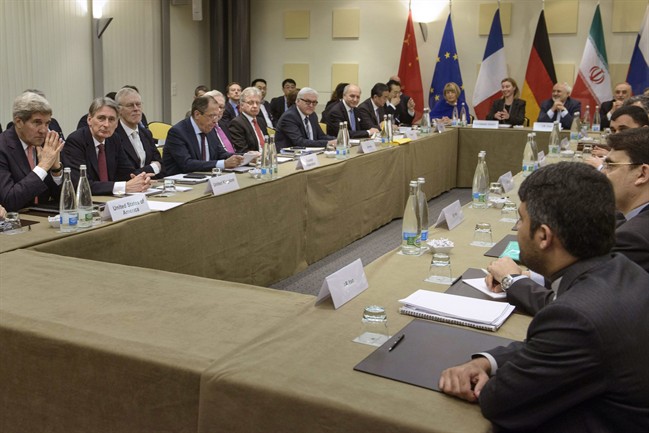LAUSANNE, Switzerland – Wrapping up six days of marathon nuclear talks with mixed results, Iran and six world powers prepared Tuesday to issue a general statement agreeing to continue negotiations in a new phase aimed at reaching a comprehensive accord by the end of June, officials told The Associated Press on Tuesday.

The joint statement is to be accompanied by additional documents that outline more detailed understandings, allowing the sides to claim enough progress has been made thus far to merit a new round, the officials said.
One of the officials said the statement was general in part because differences between the sides remained ahead of a new phase of negotiations toward a comprehensive deal by late June. The second official said other documents will be more technical in nature and will also be made public later in the day.
Both demanded anonymity because they are not authorized to comment on the talks.
The documents were being finalized among the six countries negotiating with Iran, and the Iranian side had not yet signed off on them, said the first official.
Russian Foreign Minister Sergey Lavrov, who left Lausanne Monday, was heading back to the Swiss city, also indicating that an end to the talks was near. He departed on Monday but said he would return if a deal was imminent.
Foreign ministers of five nations at the table already joined U.S. Secretary of State John Kerry and Iranian Foreign Minister Mohammad Javad Zarif at the talks over the weekend in an intense effort to reach a political understanding on terms that would curb Iran’s nuclear activities in exchange for sanctions relief.
Kerry and others at the table said the sides have made some progress, with Iran considering demands for further cuts to its uranium enrichment program but pushing back on how long it must limit technology it could use to make atomic arms. In addition to sticking points on research and development, differences remain on the timing and scope of sanctions removal, the officials said.
The Obama administration says any deal will stretch the time Iran needs to make a nuclear weapon from the present two to three months to at least a year. But critics object that it would keep Tehran’s nuclear technology intact.
Officials in Lausanne said the sides were advancing on limits to aspects of Iran’s program to enrich uranium, which can be used to make the core of a nuclear warhead.
Uranium enrichment has been the chief concern in over more than a decade of international attempts to cap Iran’s nuclear programs. But Western officials say the main obstacles to a deal are no longer enrichment-related but instead the type and length of restrictions on Tehran’s research and development of advanced centrifuges and the pace of sanctions-lifting.
Over the past weeks, Iran has moved from demanding that it be allowed to keep nearly 10,000 centrifuges enriching uranium, to agreeing to 6,000. The officials said Tehran now may be ready to accept even fewer.
Tehran says it wants to enrich only for energy, science, industry and medicine. But many countries fear Iran could use the technology to make weapons-grade uranium.

Comments